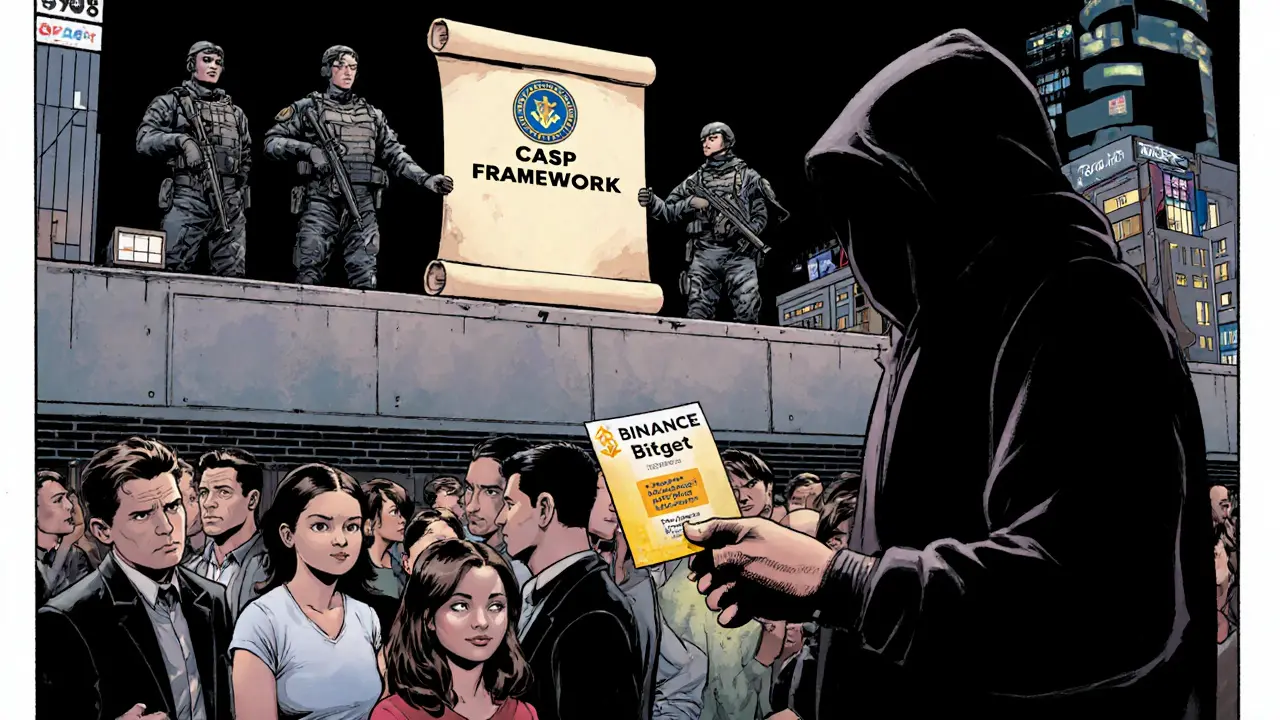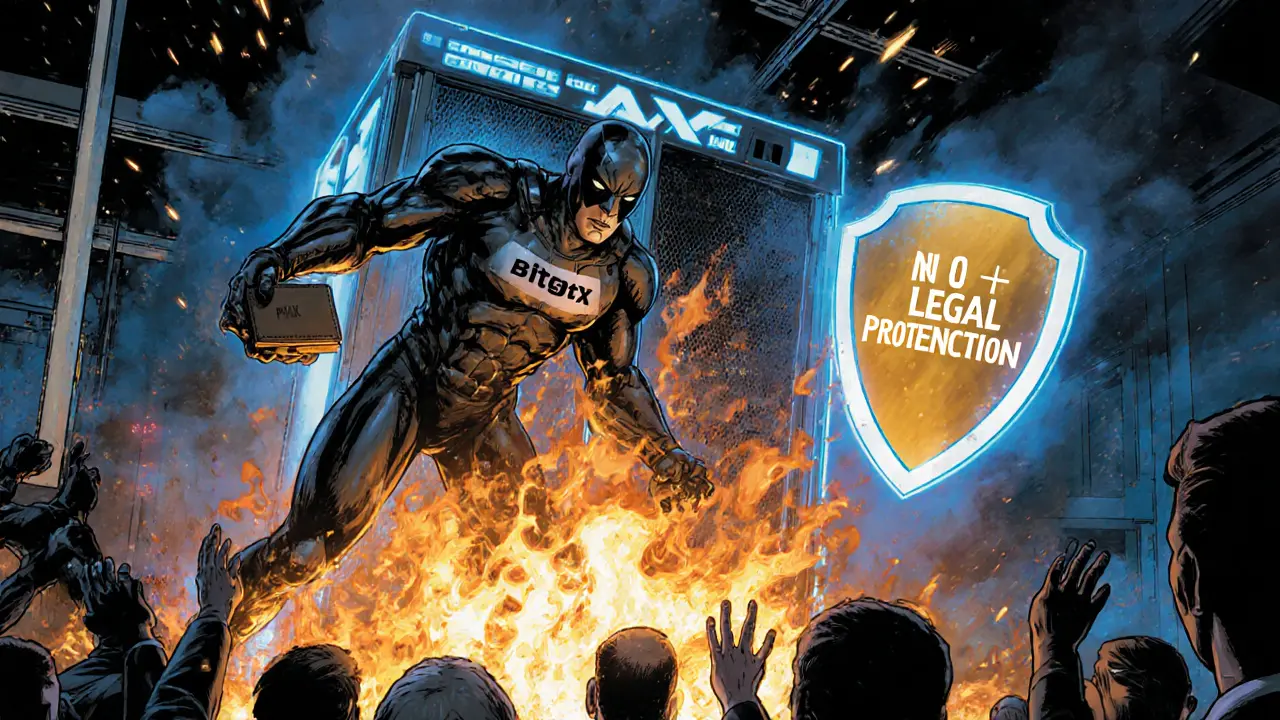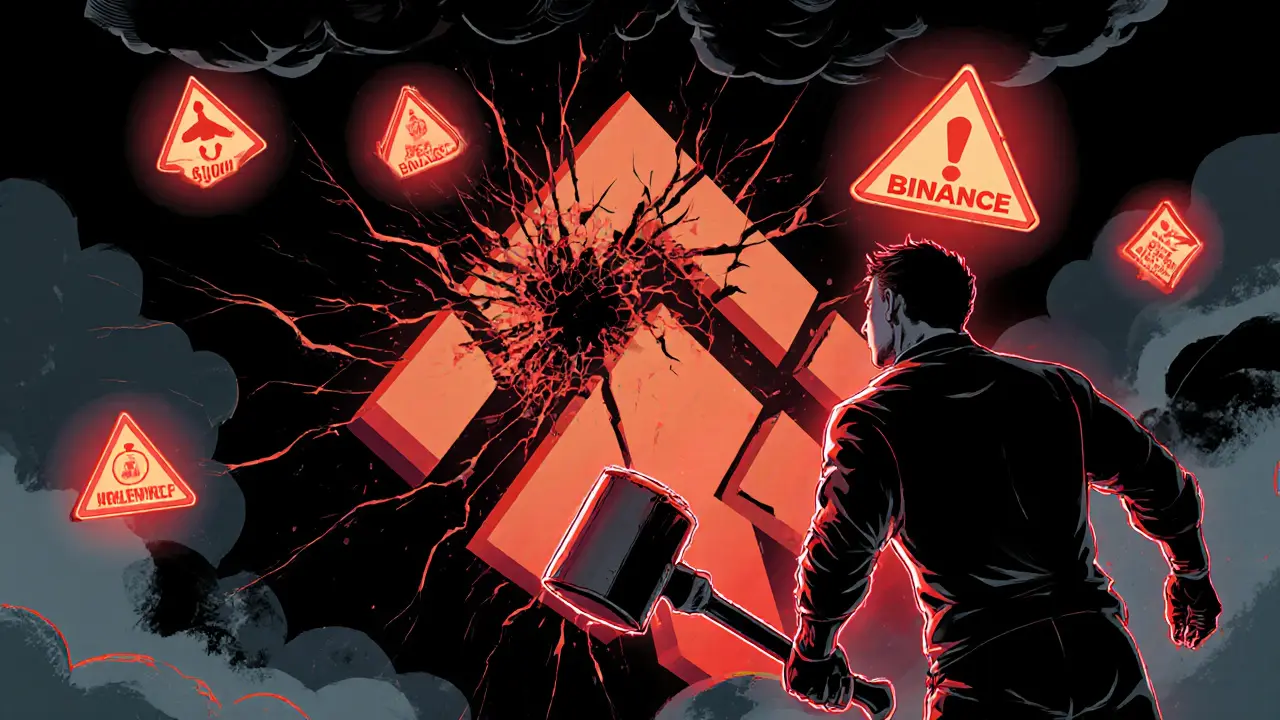Crypto Exchange Compliance Checker
Check Compliance with Philippine CASP Rules
Enter the name of a crypto exchange to check if it meets the Philippines' regulatory requirements under the CASP framework. Based on the SEC's Memorandum Circular No. 4 and No. 5.
When the Philippines blocked Binance in March 2024, thousands of traders didn’t just lose access to a platform-they lost their primary way to trade crypto. Now, with new rules in place and enforcement tightening, the same fate could come for Bitget and other major exchanges. This isn’t just about a website being down. It’s about legal risk, financial exposure, and what happens next if you’re still trading on these platforms.
Why Binance Got Blocked in the Philippines
Binance wasn’t quietly ignored. The Philippines Securities and Exchange Commission (SEC) issued a formal warning in November 2023, saying the exchange was operating illegally. No license. No registration. No oversight. Just a global platform serving Filipino users without any local compliance. By March 2024, the SEC, working with the National Telecommunication Commission (NTC), started blocking Binance’s website and app. The message was clear: if you want to operate here, you follow our rules-or you’re out. The SEC didn’t just shut it down overnight. They gave users 90 days to withdraw funds. That’s unusual. Most countries just cut access. But the Philippines wanted to minimize harm to retail traders. Still, after those 90 days, the site stayed blocked. Even today, Binance’s domain is inaccessible from local ISPs. And the SEC has kept warning the public: “Binance is still promoting itself on social media. People promoting it can be criminally liable.”The New Rules: CASP Framework Takes Effect
The real turning point came in May 2025, when the SEC rolled out Memorandum Circular No. 4 and No. 5-the country’s first full Crypto Asset Service Provider (CASP) framework. These rules didn’t just target Binance. They targeted every crypto exchange serving Filipinos. Under the new rules, any exchange wanting to operate legally in the Philippines must:- Be registered as a domestic corporation
- Have at least ₱100 million (about $1.8 million USD) in capital
- Have a physical office inside the Philippines
- Submit monthly financial reports
- Keep customer funds completely separate from company funds
Is Bitget Also Restricted?
Bitget isn’t named in the August 2025 SEC advisory that listed OKX, Bybit, KuCoin, and Kraken as unlicensed operators. But that doesn’t mean it’s safe. The CASP rules apply universally. If Bitget is serving Philippine customers without registering, it’s breaking the law. There’s no loophole. No exception. The SEC’s enforcement strategy is clear: target the biggest players first, then expand. Binance was the first. Now, the SEC is moving down the list. Bitget, with its heavy marketing in Southeast Asia and large Filipino user base, is a logical next target. The fact that it hasn’t been named yet doesn’t mean it’s exempt. It means the enforcement hasn’t reached it yet. If you’re still using Bitget in the Philippines, you’re using an unregistered service. That puts you at risk-not just financially, but legally.
What Happens If You Keep Using Binance or Bitget?
Some users think, “I can just use a VPN.” And yes, many do. VPN providers are even advertising services like “Access Binance in Philippines” with promises of “high encryption” and “no blocks.” But here’s the problem: the SEC doesn’t just go after exchanges. They go after promoters. That includes:- Influencers who post affiliate links
- Group admins who share login tips
- Friends who tell you how to bypass the block
What Are the Alternatives?
There are licensed crypto platforms operating in the Philippines. They’re smaller. They’re slower. But they’re legal. These include:- Paxful (licensed as a CASP)
- Coins.ph (licensed, offers crypto trading and wallet services)
- PDAX (Philippine Digital Asset Exchange, fully regulated)

Regional Context: This Isn’t Just the Philippines
The Philippines isn’t alone. Thailand blocked five major exchanges in May 2025. Indonesia raised taxes on offshore crypto trades from 0.2% to 1%. Singapore tightened licensing rules. Malaysia is cracking down on unlicensed platforms. This is a regional shift. Governments are tired of crypto exchanges operating like ghost companies-taking money from locals, paying no taxes, and vanishing when things go south. The Philippines is leading the charge in Southeast Asia with the strictest rules. But others are catching up fast. Binance’s global troubles mirror this trend. It’s banned in the U.S., fined in the Netherlands, and had executives detained in Nigeria. It’s been fined $4.3 billion by the U.S. Treasury. This isn’t a local problem. It’s a global reckoning.What Should You Do Now?
If you’re still using Binance or Bitget in the Philippines, here’s what you need to do:- Stop promoting it. Don’t share links. Don’t post on social media. Don’t recruit others. You could be held criminally liable.
- Withdraw your funds. If you haven’t already, move your crypto to a licensed platform or a personal wallet. Don’t wait for a block.
- Switch to a licensed exchange. Use PDAX, Coins.ph, or Paxful. They’re safe, legal, and growing.
- Don’t use VPNs to bypass blocks. It doesn’t make you safe. It makes you a target.
- Stay informed. The SEC updates its advisories regularly. Check their website monthly.
Is Binance completely banned in the Philippines?
Yes. Binance’s website and app have been blocked by the Philippine government since March 2024. Access is restricted by local internet providers, and the SEC has repeatedly warned the public not to use it. The platform remains inaccessible without using a VPN, but doing so carries legal risks.
Is Bitget banned in the Philippines too?
Bitget is not officially named in the SEC’s August 2025 enforcement list, but it is not legally allowed to operate in the Philippines. Under the new CASP framework, all exchanges serving Filipino users must register. Bitget has not done so, meaning it is operating illegally. Enforcement against it is likely, following the pattern set with Binance and other exchanges.
Can I use a VPN to access Binance or Bitget?
Technically, yes-but legally, it’s risky. While using a VPN to bypass blocks is common, the SEC considers promoting or enabling access to unregistered exchanges a criminal act. If you’re actively helping others use these platforms through a VPN, you could face legal consequences. It’s not a safe workaround.
What happens if I don’t withdraw my crypto from Binance or Bitget?
Your funds could be locked or lost with no recourse. Unregistered exchanges have no legal obligation to protect your assets. If the platform is shut down, hacked, or collapses, you won’t be able to recover your money. There’s no regulator to file a claim with. The SEC explicitly warns users to withdraw funds from unlicensed platforms immediately.
Are there any legal crypto exchanges in the Philippines?
Yes. Licensed platforms include PDAX, Coins.ph, and Paxful. These are registered with the SEC, follow strict financial reporting rules, and keep customer funds separate. They offer fewer trading pairs and higher fees than Binance, but they’re legal and safe. Using them protects you from regulatory and financial risk.


Anne Jackson
November 24, 2025 AT 18:21John Borwick
November 24, 2025 AT 20:38Jennifer Morton-Riggs
November 25, 2025 AT 11:31Soham Kulkarni
November 27, 2025 AT 01:46Dave Sorrell
November 28, 2025 AT 16:42Sky Sky Report blog
November 30, 2025 AT 00:30stuart white
December 1, 2025 AT 00:22David Hardy
December 2, 2025 AT 20:57Gus Mitchener
December 3, 2025 AT 03:07Tejas Kansara
December 3, 2025 AT 03:33Jody Veitch
December 3, 2025 AT 17:39Linda English
December 5, 2025 AT 11:18asher malik
December 7, 2025 AT 07:15